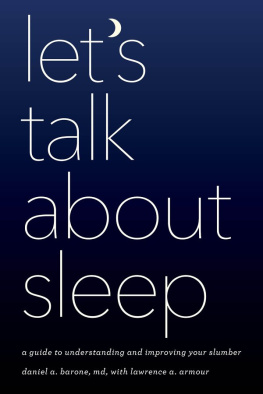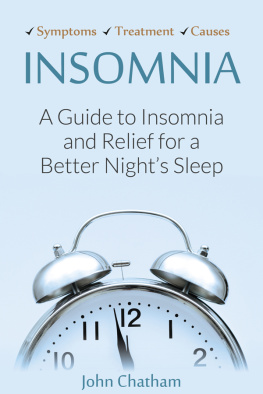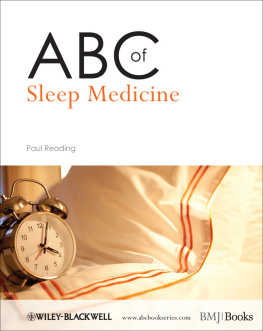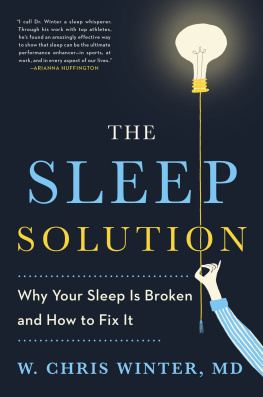Lets Talk about Sleep
Lets Talk about Sleep
A Guide to Understanding and
Improving Your Slumber
Daniel A. Barone, MD,
with Lawrence A. Armour
ROWMAN & LITTLEFIELD
Lanham Boulder New York London
The information contained in this book is designed to help the reader make informed decisions regarding sleep and wellness. This book is not a medical manual. It is not a replacement for treatment(s) that the readers personal physician may have suggested. If the reader is experiencing a medical issue, professional medical help is recommended. Mention of particular products, companies, or authorities in this book does not entail endorsement by the publisher or author.
Published by Rowman & Littlefield
A wholly owned subsidiary of The Rowman & Littlefield Publishing Group, Inc.
4501 Forbes Boulevard, Suite 200, Lanham, Maryland 20706
www.rowman.com
Unit A, Whitacre Mews, 26-34 Stannary Street, London SE11 4AB
Copyright 2018 by Rowman & Littlefield
All rights reserved. No part of this book may be reproduced in any form or by any electronic or mechanical means, including information storage and retrieval systems, without written permission from the publisher, except by a reviewer who may quote passages in a review.
British Library Cataloguing in Publication Information Available
Library of Congress Cataloging-in-Publication Data Is Available
ISBN 978-1-5381-0398-2 (cloth: alk. paper)
ISBN 978-1-5381-0399-9 (electronic)
 TM The paper used in this publication meets the minimum requirements of American National Standard for Information Sciences Permanence of Paper for Printed Library Materials, ANSI/NISO Z39.48-1992.
TM The paper used in this publication meets the minimum requirements of American National Standard for Information Sciences Permanence of Paper for Printed Library Materials, ANSI/NISO Z39.48-1992.
Printed in the United States of America
Introduction
Hamlet in his famous To be or not to be soliloquy refers to sleep, specifically to sleep, perchance to dream, but Shakespeare was hardly the first to weigh in on the subject and delve into how sleep impacts our brain, mind, body, and soul.
In fact, writers of the Bible, the Ancient Egyptians, Socrates, Plato, and Aristotle, to name a few, had fascinating things to say about sleep. And what is even more interesting is that much of what the early societies thought about proper sleep is actually relevant today, with all that we now know about sleep and sleep disorders.
In Ancient Greece, for example, sleep and death were considered
Another example of the many ways past societies had real wisdom regarding sleep can be found in the Islamic tradition. The prophet Muhammad outlined the right way for his followers to live, which included advice on how to sleep. He advised them to lie on [their] right side, among other recommendations. the stoppages of breathing occur because the tongue and/or soft tissues fall toward the back of the throat. Sleeping on the side not only may reduce or eliminate obstructive sleep apnea, but it is also the most neutral position for ones neck (with head supported on a pillow) and spine.
We have all heard of, and probably experienced, insomnia at about making ones bed environment dark. A cool, dark bedroom is another aspect of good sleep hygiene and can be an effective countermeasure against insomnia.
Finally, the Ancient Chinese utilized the pulse as an important tool in the diagnosis of disease. First mentioned in the classic work of internal medicine Nei Ching, written
These early insights into sleep health are fascinating to talk and think about, and I mentioned just a few of the many that have been reported. But what is definitely shown to us through them is that our current age is not the first to think about and opine on the various aspects of sleep. To this point, nowadays, news about sleep is everywhere we turn, accompanied by an avalanche of numbing statistics. In case you missed them, here are a few:
According to the National Institutes of Health, fifty to seventy million Americans are affected by chronic
Some 3035 percent of adults complain of insomnia.
One in every twenty-five Americans takes a prescription sleep medication.
More than a third of American adults
Sleep disorders account for an estimated $16 billion in medical costs each year, plus indirect costs due to missed days of work, decreased productivity, and related factors.
But forget the statistics for a second. What happens to the brain when we sleep is one of the most fascinating and mysterious questions in all of science. Questions such as: What is the environment on other planets like? What is a star composed of? and Do other galaxies exist? have all been answeredbut why do we sleep? What happens when we sleep? We know biochemically what is happening in the brain, and that in sleep the brain is still active, but what about the mind? What about the soul? And what about dreams? We believe that an aspect of consciousness is preserved in dreams, but what does that tell us about consciousness?
Ive been fascinated by sleep for years. Through this book, my goal is to sharein a friendly, readable waythe highlights of what I have learned and what I share with my patients on a daily basis. We will discussin terms everyone can understandwhat we know about sleep, what can go wrong with it, and what we can do to fix it. To add a fresh dimension, we have included firsthand stories of people who suffer from sleep disorders and what they have done to deal with them.
Along the way on our sleep journey, we will take a look at the conditions you may have heard or read about, such as obstructive sleep apnea and insomnia, mentioned above. But we also will be delving into sleep problems you may not have even known existedthings like narcolepsy, exploding head syndrome, restless legs syndrome, and sexsomnia.
Additionally, we will be talking about the popular medications out there to treat sleep; we will go into what they are, how they work, and if they are effective. As you will soon see, I prefer to try natural remedies first with my patients, if the situation permits. For example, you are going to read about the natural supplement known as melatonin, a hormone made by our brains daily that can now be taken in pill form. And about the sleep-inducing properties of a plant known as valerian.
Im certain you are constantly inundated with advertisements of new technologies and apps that are popping up on an almost daily basis. We will discuss these and look at whether or not they are truly effective in promoting sleep.
We will close the book with a discussion of dreamswhat they may mean, what research has shown us about them, and what the brilliant minds of both science and spirituality have said about them.
While you can read this book cover to cover, and I hope you do, dont see it as an assignment. Feel free to skip around or jump to a chapter that pertains to a problem you or a loved one may be suffering from.
I had fun writing this book. In addition to finding useful information and suggestions that will improve all aspects of your life, I hope you have fun reading it.
Daniel A. Barone, MD, 2017
Notes
J. Bresson, N. Liu, M. Fischler, and A. Bresson. Anesthesia, sleep and death: From mythology to the operating room, Anesthesia and Analgesia. 2013; 117 (5):125759.
A. S. Bahammam. Sleep from an Islamic perspective. Annals of Thoracic Medicine. 2011; 6 (4):18792.
S. Ancoli-Israel. Sleep is not tangible, or what the Hebrew tradition has to say about sleep. Psychosomatic Medicine. 2001; 63 (5):77887.
J. Preuss. Julius PreussBiblical and Talmudic Medicine






 TM The paper used in this publication meets the minimum requirements of American National Standard for Information Sciences Permanence of Paper for Printed Library Materials, ANSI/NISO Z39.48-1992.
TM The paper used in this publication meets the minimum requirements of American National Standard for Information Sciences Permanence of Paper for Printed Library Materials, ANSI/NISO Z39.48-1992.